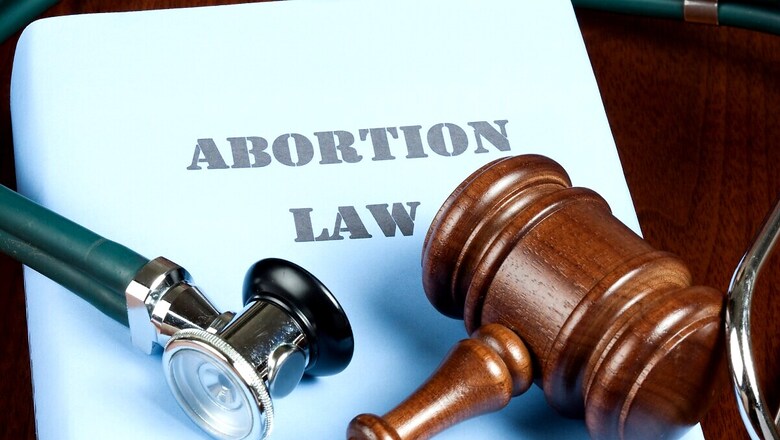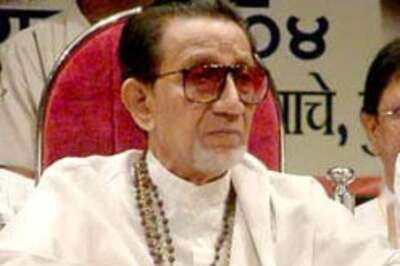
views
On Monday, the Supreme Court dismissed the request of a married woman to terminate her pregnancy which had progressed beyond 26 weeks.
Ruling in favour of pro-life, the bench of Chief Justice of India DY Chandrachud passed the order based on medical reports submitted by All India Institute of Medical Sciences (AIIMS, New Delhi) indicating that there are no threats to the mother’s life and the absence of any foetal abnormalities.
On the preceding Friday, the court requested a report from the AIIMS medical board to determine if the 26-week-old foetus of a married woman, who is seeking approval for a pregnancy termination, exhibits any abnormalities. The hospital’s report was filed on October 13.
Although majority of medical experts supported the apex court’s position, underscoring that terminating a pregnancy at 26 weeks is inadvisable due to the advanced development of the foetus, some argued that the importance of preserving the life of a woman grappling with a severe psychiatric illness should not be eclipsed by the sanctity of foetal life.
However, not many doctors chose to come on record while sharing their perspective which was against SC’s decision.
While three top hospital chains refused to comment on the judgement, multiple gynaecologists agreed to share their opinions on condition of anonymity.
Killing a ‘Pre-Term’ Baby or Pushing a ‘Psychosis Patient’ to Carry a Child
According to medical experts, there are two differing perspectives.
“We call babies – who are born around 26 weeks – pre-term babies. Hence, it’s incorrect to call it an abortion. It’s called pre-term delivery or termination of pregnancy,” Rinku Sengupta, obstetrician and gynaecologist at Rainbow Children’s Hospital, told News18.
To illustrate the typical implications of a 26-week pregnancy, she explained that in emergency situations, women can often have a successful childbirth, and most babies will thrive, sometimes necessitating a few days of intensive care.
“When someone opts for termination, fetotoxic drugs are given to terminate the heartbeat and later, the foetus is taken out generally by inducing labour. C-Section is avoided.”
“For instance,” she said citing examples from other countries, “such drugs are injected but only in cases where the foetus has a proven anomaly such as Down Syndrome or the mother’s life is at critical risk.”
While Sengupta appreciated the SC’s decision, she also expressed concern for the would-be mother. “How bad is her health is my concern. The severity of post-partum depression varies and medicines will help her get better.”
Opinions differ and there are numerous other physicians who hold the view that the mother’s choice should be paramount.
“I personally, to the best of my ability, do not condone this judgment. A patient of psychosis should not be forced to carry a pregnancy she doesn’t want,” an obstetrician and gynaecologist told News18, requesting anonymity.
“Psychosis is a major mental illness,” she said, adding that “forcing such a patient to carry a pregnancy to term against her will is neglecting the well-being of a fully grown adult woman, for the sake of saving the life of a 26-week foetus who has yet to experience any life and would have 90 per cent mortality if born at this gestational age.”
She highlighted that “the court should take into view the provision in the Medical Termination of Pregnancy (MTP) Act that if the pregnancy were to cause serious psychological harm to the mother, it can be made to undergo a medical termination.”
“Every case is unique, and the sanctity of foetal life at 26 weeks should not overpower the sanctity of life of a woman suffering through a major psychiatric illness.”
Experts Backing SC Decision
According to Dr Ruby Sehra, senior consultant, gynaecology at Sri Balaji Action Medical Institute, the court’s decision to reject the plea is “worth applauding”. Sehra said that it’s crucial to understand that the health and well-being of a woman should always be the “top priority”.
“Late-term abortions carry significant risks, and the complications a woman could face are extensive, including haemorrhage, infection, and injury to the uterus or surrounding organs.” Furthermore, the lifelong implications of such a decision cannot be underestimated, she said.
“Both physical and emotional well-being can be severely impacted. Post-abortion, women experience guilt, depression, and long-lasting emotional trauma which is mostly hard to overcome.”
She said that physically, there could be potential fertility issues, scarring, or other complications.
“In such cases, the best approach is to provide comprehensive medical care and support to the woman. It’s a challenging decision, but, it is the one that safeguards the woman’s overall health,” she advised.
Dr Sumit Ray, medical director at Holy Family Hospital, New Delhi, said, “My viewpoint is always in support of the mother’s health, both physical and psychological, and it is for women to decide what is right for their health and they should be the ones to have control over their bodies.”
What Does the AIIMS Report Say?
According to the latest report submitted by a panel headed by K Aparna Sharma, “…the foetus does not have any structural anomaly at the present time…”
The SC’s decision is based on this report accessed by News18.
“The continuation of pregnancy to full term while the woman is on the revised medications (as advised by the psychiatrist on the board) is not likely to significantly increase the risk of adverse outcomes for the mother and foetus as compared to other pregnant woman.”
On a psychiatric assessment, the board said: “She has a past history of postpartum psychosis, currently controlled on medications. Her medications have been reviewed and revised for optimal management.”
The board concluded that “with proper care and treatment under appropriate medical supervision, the mother and baby can be managed well during pregnancy and postpartum as has been previously evidenced by her response to medications.”
“In case of worsening of symptoms, she may be admitted and treated.”


















Comments
0 comment